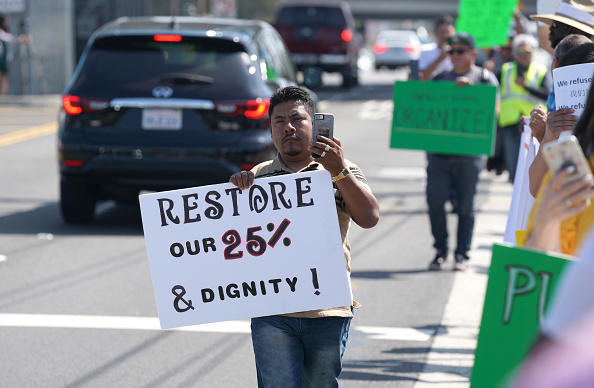On Monday, hundreds of Uber and Lyft drivers across Los Angeles held a 25-hour strike to protest against pay cuts and poor working conditions, as reported by NBC News. Their strike also included protesting together outside of Uber’s offices in Redondo Beach, California.
The strike was partially driven by Uber reversing a September 2018 decision that increased the per-minute rate and minimum fare, Curbed Reported. Essentially, drivers now have to take a 25 percent cut in pay.
Advocacy group Rideshare Drivers United-Los Angeles, demanded Uber reverse its decision to slash wages and guarantee a $28-per-hour minimum rate, as reported by NBC Los Angeles.
Both Uber and Lyft have faced criticism before for their poor wages. Although Ridester — an online source for rideshare drivers — notes that Uber claims drivers make $25 per hour and Lyft says they make $35, each company takes heavy cuts (25 percent and 20 percent of each fare, respectively, along with booking fees).
Both Uber and Lyft defended themselves in statements to NBC News. Uber said its changes will “make rates comparable” to September, and give drivers more control over how they earn.
However, those protesting Monday said Uber’s decision was due to the company cutting costs prior to their initial public offering, as reported by Curbed. It’s worth noting that Lyft also plans to go public this week.
Lyft told NBC News, “The vast majority of drivers use Lyft as a temporary source of extra money — in fact, 91% drive fewer than 20 hours a week” and added that its own prices haven’t changed in 12 months.
In addition to launching their IPO, Uber recently bought rival company Careem in the biggest acquisition of a Middle Eastern Tech Company ever, as reported by the Wall Street Journal.
As Uber faces strikes from its workers in the United States, people should look carefully at the company’s attempts to conquer other markets. After all, if you can’t pay one group of workers fairly, then there’s no reason to expect fair treatment for the other.
Concerns over Uber and Lyft have been boiling for some time. If drivers continue to strike in cities as big as Los Angeles, hopefully, both companies will be forced to listen.

